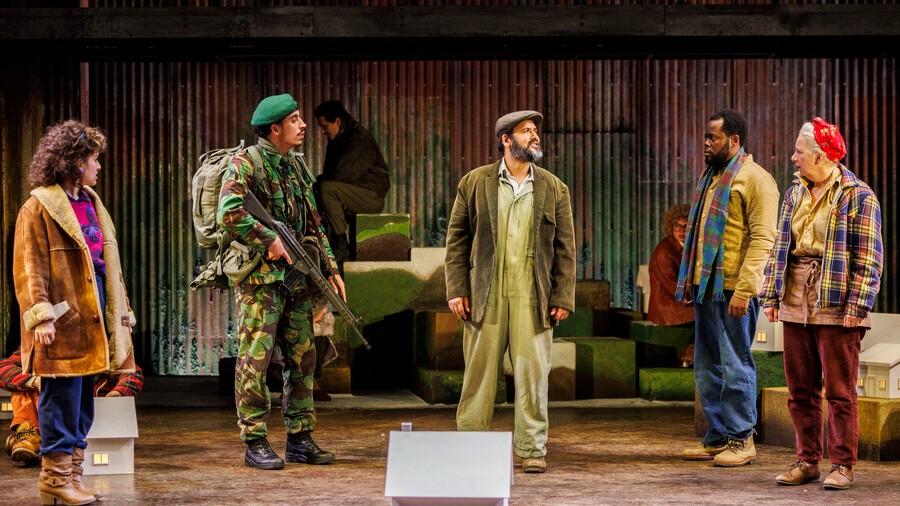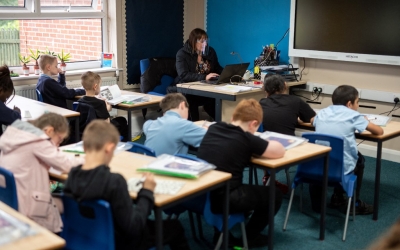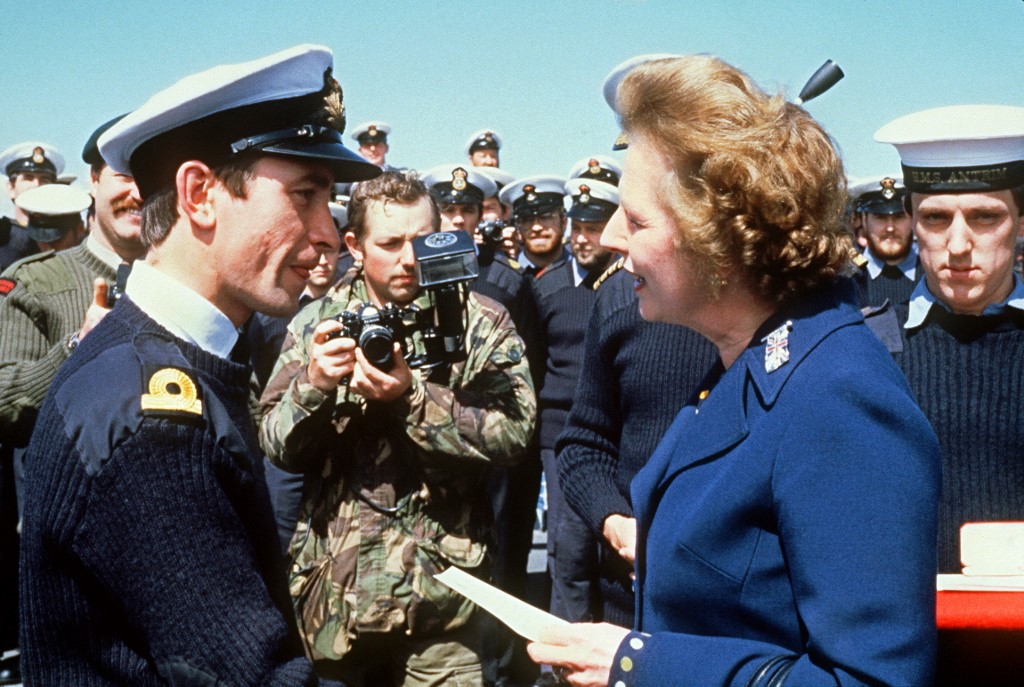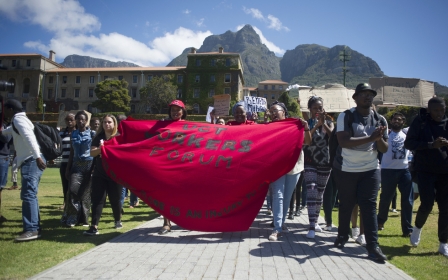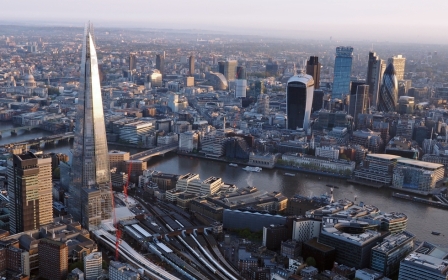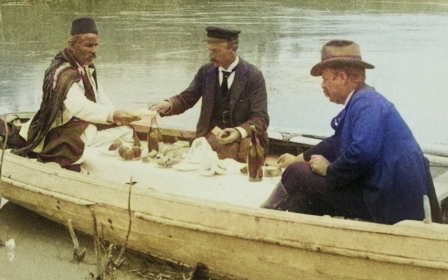The Falklands war and the legacy of British imperialism
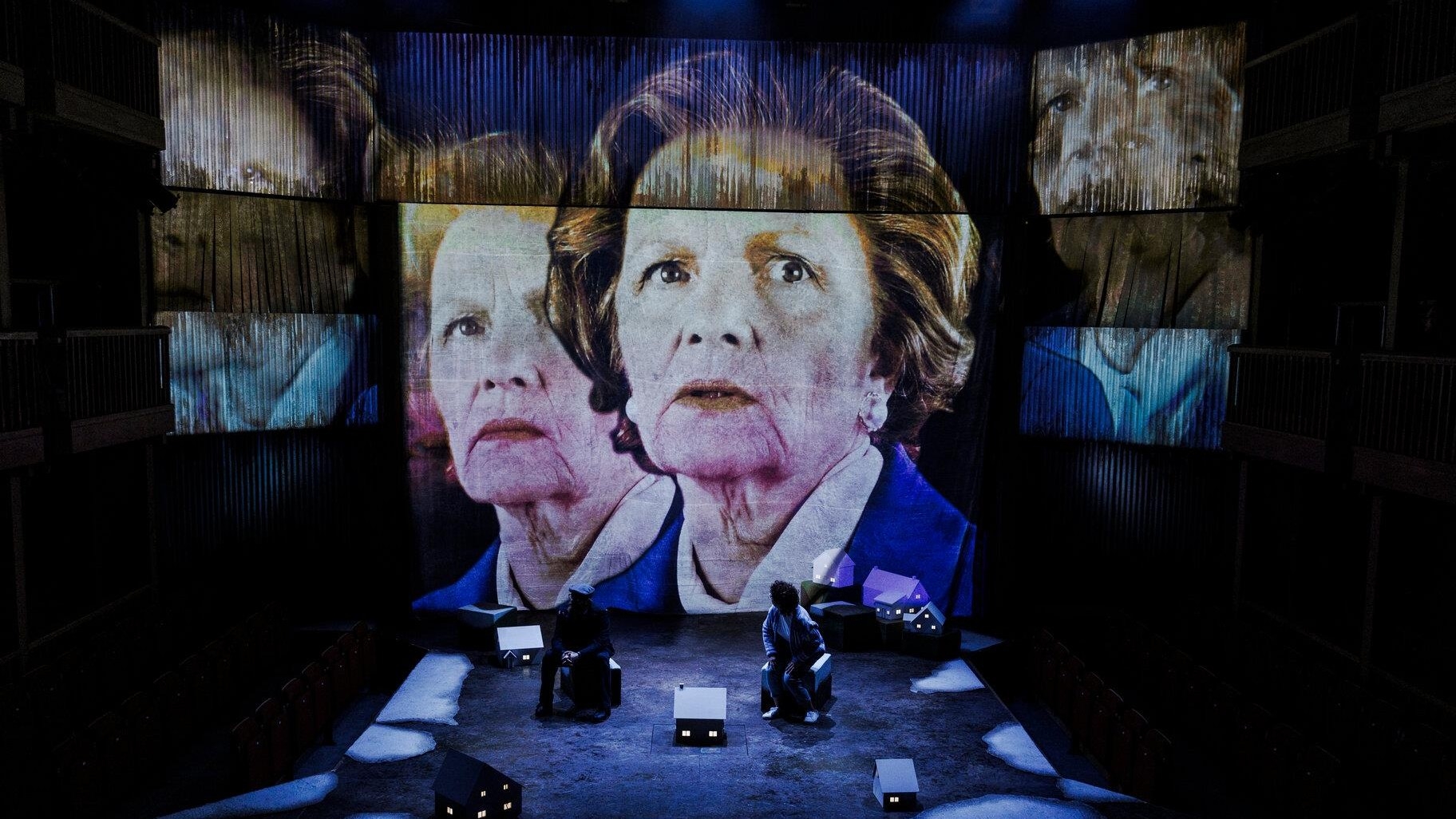
It is not easy for a "third worlder" like myself to watch, let alone enjoy, a play that narrates the story of the Falklands crisis from a British point of view.
And yet the Royal Shakespeare Company’s Falkland Sound provided for a rich, enjoyable and thought-provoking - if at times uneasy - watching experience.
The play commenced with an idyllic, mostly first-person narrative of life on the Falkland Islands (known as Islas Malvinas in Argentina), reminiscent of Thornton Wilder's Our Town, which was set in a small fictional US town at the start of the 20th century.
Yet, this tranquillity was quickly shattered in April 1982 when, first, Argentina invaded and claimed sovereignty over the islands, followed shortly after by the dispatching of a UK task force to reclaim them. The war lasted 74 days, resulting in the deaths of 904 military personnel, and ended with the Argentinians surrendering on 14 June.
The islanders found themselves in the crossfire between an Argentine military dictatorship and a rising wave of British populism, which cared less about the islanders and more about how it could capitalise on the crisis for jingoist clout.
New MEE newsletter: Jerusalem Dispatch
Sign up to get the latest insights and analysis on Israel-Palestine, alongside Turkey Unpacked and other MEE newsletters
It seemed initially as if we were about to witness something akin to an American "salt of the earth narrative", glorifying the peasantry and the working class, and especially the white working class, to serve a nationalist agenda. One character in the play even referenced this genre, likening their life to Little House on the Prairie.
However, the script skillfully subverted this tendency through theatrics and contextualisation within news and world politics. It did so in a manner reminiscent of Bertolt Brecht's techniques, briefly alienating the audience from the story while grounding them in political reality.
The play, which ended its run at the Swan Theatre, Stratford-upon-Avon on 16 September, had news bulletins narrated by chorus members doubling as reporters punctuating the narrative and infusing it with urgency.
At times, an element of "political cabaret" was added, effectively utilising the music, colours and aesthetics of the 1980s and illustrating how electoral and populist politics turned urgent questions into a burlesque.
British imperial legacy
Underneath the "salt of the earth" narrative and the projected hard shell and the (at times, tediously repetitive) references to the resilience of the islanders, is a more compelling story of human vulnerability when this hard shell breaks: of lives that crumble under the weight of military rule.
Yet more compelling for me was the way the play was able to sensitively deal with political themes and with the British imperial legacy.
The play and its target audience may not understand why Argentinians and other formerly colonised nations will remain suspicious of the claims of the settlers. We are assured time and again that the islands were empty when the British settled in them: this may be historically true, but against a history of the British empire declaring populated places empty and proceeding to empty or subdue them by force, the veracity of the Falklanders’ particular claim is less likely to move us.
The islanders may not understand how the operation could be perceived by Argentinians as one of anticolonial pride (not only for the South Americans but also for us in the Middle East and other parts of the world), even if we know that in reality it was concocted for populist aims by a right-wing military dictatorship supported by the US and which was brutal towards its own people.
The play, nevertheless, allows for all of these sentiments to be read into the performance.
This is partly done through Sebastian, the Argentine invading officer. He serves as a poignant representation not only of the Argentinian perspective but also of the broader third-world point of view: he deploys anticolonial rhetoric and relays the pride back home in the operation.
But he is also the representative of a military dictatorship and he finds himself charged with disseminating lies and covering up for both the brutality of the military regime and the horrors of war. While he tries to keep his composure in public, in private he collapses - first vomiting, then crying.
From the islanders’ perspective, he might be seen as their nemesis, but he is undeniably sympathetic, and genuinely invested in making things work, despite the adversarial circumstances.
'Thatcher, Thatcher, milk snatcher'
The play is primarily about the Falkland settlers, but there is a sub-story about Argentina: about military dictatorship and its mobilisation of nationalist symbols and aspirations, and of the torture, assassination and forced disappearances under military rule.
This gives the islanders a practical reason to want to remain British - nationalist allegiance aside. But the play’s criticism of the Argentinian junta does not slip into a celebration of western democracy. In addition to acknowledging the role of the West in propping up military dictatorships in Latin America as part of the cold war, the UK government is not spared from criticism.
The play’s criticism of the junta consciously sounds like a criticism of the populist right-wing Tory governments (of 1982 and the present day). For example, a reporter notes: "Let’s be frank, their government is a historically crazed, hyper-nationalistic, economically incompetent, nostalgia-driven boy’s club and it’s hard to see any country could function with that kind of… I should stop talking, shouldn’t I?"
On the British side, the narrators/news presenters introduce Margaret Thatcher as the unpopular politician who put limits on the provision of free milk to school children while a youthful member of the crowd (in a typical 80s hairstyle and leather jacket) chants: "Thatcher, Thatcher, milk snatcher!"
As the crisis builds up, we see how jingoism and nostalgia for imperialism played a role in enabling Thatcher to capitalise on the crisis.
Debating the military operation, one chorus member/news reporter notes: "We are still in Belize… and Zimbabwe, and Oman, and Ulster."
References to Northern Ireland recur: every moment the depiction of the British military and its war effort may seem glorious, the narrative counterpoises this with a reference to Northern Ireland, grounding the audience in the ugly realities of militarism.
The chorus representing the British public, though aware not to explicitly invoke empire, uses a jingoist language worthy of the junta.
Nostalgic model for Britishness
The British public cheering on the military buildup in preparation for recapturing the islands are more interested in a fantasy of Britishness than in the lives of the islanders. They had been largely unaware of the existence of the Falklands, but now they identified the idyllic life of the islanders as a nostalgic model for England and Britishness.
While chorus members express pride in the sight of the military task force gathering in the ports and sailing for war, one character admits "tearing up a bit".
I was concerned that the impending British victory might inevitably lead to a triumphal and jingoistic moment on stage. Nothing of the sort transpired
These tears are answered by the tears of pride the residents of Stanley shed when the British start bombing their town. "How silly," one of the islanders says, "to have tears of joy in your eyes when you are being bombed."
Silly indeed, as the bombing will kill one of their neighbours, wipe out some of their favourite buildings and leave a permanent scar on the architecture and psyche of the town. In addition to the destruction and grief, the islanders, in the play's epilogue, begin to realise that the strengthened British military presence is also imposing.
"There’s more military now," one character comments. "We’ve always had soldiers here but you soon realise there’s a big difference between being protected and being defeated."
Towards the conclusion, I was concerned that the impending British victory might inevitably lead to a triumphal and jingoistic moment on stage. Nothing of the sort transpired.
Instead, the announcement of victory is made by the intimidating figure of Margaret Thatcher, who emerges as a terrifying presence, foreshadowing the impending rise of Thatcherite populism and how the Falklands "victory" helped turn the once unpopular politician into a monster.
The views expressed in this article belong to the author and do not necessarily reflect the editorial policy of Middle East Eye.
Middle East Eye delivers independent and unrivalled coverage and analysis of the Middle East, North Africa and beyond. To learn more about republishing this content and the associated fees, please fill out this form. More about MEE can be found here.



